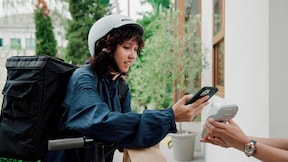Credit card basics
Credit cards can be useful when needed, but you can get the biggest benefits when you understand the basics of credit.
Learning about the basics of credit
credit card basicsWhat are government rates for car rentals?

Find out about possible special car rental rates for government employees and whether you may be able to access them.
credit card basicsGuide to car rentals for executive travel

Executive business travel takes careful planning and attention to detail, including car rentals during a trip. Find out some ways to book a rental car for executive travel with our guide.
credit card basicsGetting started with your first credit card

Explore ways to use your first credit card with helpful tips on activation, thoughtful spending, building credit and avoiding common pitfalls. Start your financial journey with confidence and informed habits.
Learn ways to use your credit card wisely
credit card basics
Getting started with your first credit card Explore ways to use your first credit card with helpful tips on activation, thoughtful spending, building credit and avoiding common pitfalls. Start your financial journey with confidence and informed habits.
Explore ways to use your first credit card with helpful tips on activation, thoughtful spending, building credit and avoiding common pitfalls. Start your financial journey with confidence and informed habits.credit card basics
Credit cards with billing address Your billing address is used to help verify your identity and send communications to you. Learn how to find your billing address and update it if needed.
Your billing address is used to help verify your identity and send communications to you. Learn how to find your billing address and update it if needed.credit card basics
Digital wallets and how they work Digital wallets store payment info on mobile devices, enabling secure, card-free purchases. They offer convenience, security and flexibility for modern financial management.
Digital wallets store payment info on mobile devices, enabling secure, card-free purchases. They offer convenience, security and flexibility for modern financial management.credit card basics
Using your credit card to support local businesses Shop locally with your credit card to earn rewards and cash back, benefiting both local businesses and your personal finances.
Shop locally with your credit card to earn rewards and cash back, benefiting both local businesses and your personal finances.credit card basics
Using your starter credit card abroad: What you should know Get tips for using your starter credit card abroad, including avoiding foreign transaction fees, maximizing security, and managing spending. Find out what first-time travelers should know for smooth and cost-effective international payments.
Get tips for using your starter credit card abroad, including avoiding foreign transaction fees, maximizing security, and managing spending. Find out what first-time travelers should know for smooth and cost-effective international payments.credit card basics
Why are some credit cards "easier" to qualify for than others Certain credit cards are easier to qualify for due to lower credit score requirements, security deposits and relaxed approval criteria.
Certain credit cards are easier to qualify for due to lower credit score requirements, security deposits and relaxed approval criteria.credit card basics
Managing your credit in a gig economy With the rise of short-term, flexible jobs like ridesharing and freelancing, managing your credit can be important. Discover tools to help leverage your credit card.
With the rise of short-term, flexible jobs like ridesharing and freelancing, managing your credit can be important. Discover tools to help leverage your credit card.credit card basics
Managing pet expenses with a credit card Find out how to use credit cards for pet care, earn rewards, manage budgets and avoid interest pitfalls. Make informed financial choices for your pet's expenses.
Find out how to use credit cards for pet care, earn rewards, manage budgets and avoid interest pitfalls. Make informed financial choices for your pet's expenses.
Explore financial education